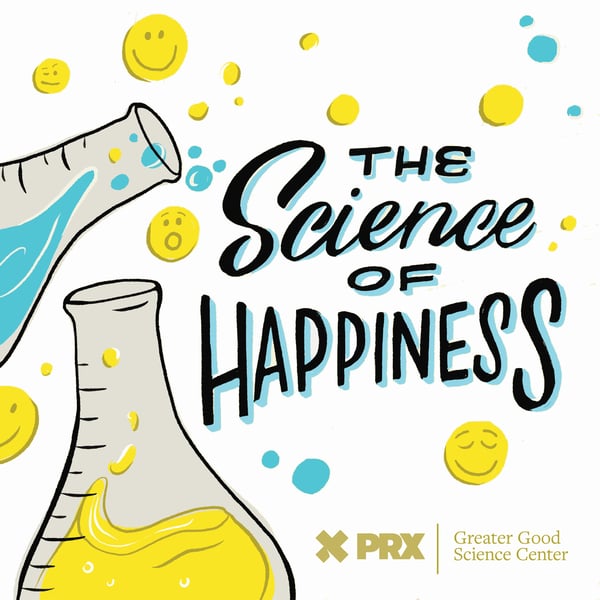Happiness Break: Who Takes Care of You?
The Science of Happiness
PRX and Greater Good Science Center
4.4 • 1.9K Ratings
🗓️ 17 April 2025
⏱️ 10 minutes
🧾️ Download transcript
Summary
When we feel cared for, our cortisol levels drop, we feel safe, and we handle stress better. Dacher leads a meditation to help us focus on the people who make us feel supported.
How To Do This Practice:
- Get Comfortable: Find a quiet spot. Sit or stand in a relaxed position. Take a few deep breaths to settle your body and mind.
- Think of a Friend: Picture a friend who has supported you. Notice how it feels to remember their care. What have they given you? Kindness, courage, laughter?
- Think of a Family Member: Now think of someone in your family (or chosen family) who’s helped you. What moment comes to mind? How did they support you? Name what they gave you.
- Think of a Mentor: Bring to mind a mentor or guide—someone who’s taught or encouraged you. How did they help you grow? What gift did they offer? Wisdom, strength, direction?
- Feel the Support: Picture all three people around you. Let yourself feel supported and held. Breathe in that sense of connection.
Scroll down for a transcription of this episode.
Related Happiness Break episodes:
Take a Break With Our Loving-Kindness Meditation: https://tinyurl.com/2kr4fjz5
A Meditation on Original Love: https://tinyurl.com/5u298cv4
Wishing Others’ Well, With Anushka Fernandopulle: https://tinyurl.com/jrkewjs8
Related Science of Happiness episodes:
Are You Remembering the Good Times: https://tinyurl.com/483bkk2h
Why Friendships Matter More Than We Think: https://tinyurl.com/y99tc9nm
Why We Should Seek Beauty: https://tinyurl.com/yn7ry59j
Follow us on Instagram: @ScienceOfHappinessPod
We’d love to hear about your experience with this practice! Share your thoughts at [email protected] or use the hashtag #happinesspod.
Find us on Apple Podcasts: https://tinyurl.com/2p9h5aap
Help us share Happiness Break! Leave a 5-star review and share this link: https://tinyurl.com/2p9h5aap
Transcription:
Transcript
Click on a timestamp to play from that location
| 0:00.0 | How much awe and wonder do you experience in your life? |
| 0:03.6 | From the John Templeton Foundation, our sponsors at the Science of Happiness, |
| 0:07.3 | the Templeton Ideas Podcast, explores the most awe-inspiring ideas in our world |
| 0:12.4 | with the people who investigate them. |
| 0:15.0 | Host Tom Burnett sits down with inspiring thinkers like Alison Gopnik, David Brooks, |
| 0:20.2 | Tyler Cowens, and Gretchen Rubin |
| 0:22.4 | to discuss how their investigations have transformed their lives and how they may transform yours. |
| 0:29.2 | Learn more at templeton.org slash podcast. |
| 0:36.8 | Hi, this is Dacre Keltner. Welcome to Happiness Break, a series from the Science of Happiness, |
| 0:41.7 | where we take a few minutes in the day to do a practice that's been supported by science |
| 0:46.6 | to find greater meaning and happiness and purpose in our lives. Today we're going to do a practice |
| 0:53.8 | that you might call Circle of Care or Support in honor |
| 0:57.9 | of the philosopher Peter Singer from Princeton University who wrote about expanding the |
| 1:02.6 | Circle of Care in 1981. |
| 1:04.7 | We know from the scientific literature that a sense of support really brings good things to |
| 1:09.9 | us in terms of well-being. |
| 1:12.6 | Just feeling supported lowers levels of cortisol. It activates regions of the brain that |
| 1:18.2 | bring us a sense of safety, and then it helps us handle stress and feel greater purpose. |
| 1:24.1 | And expanding the circle of care or support makes us aware of all the people who are supporting |
| 1:31.4 | us in myriad ways from friends to family members to mentors, strangers on the streets, acquaintances. |
| 1:38.7 | And they do it in different ways and give us different things. And this practice is bringing that |
| 1:43.6 | into our awareness in this moment, given all the scientific |
... |
Please login to see the full transcript.
Disclaimer: The podcast and artwork embedded on this page are from PRX and Greater Good Science Center, and are the property of its owner and not affiliated with or endorsed by Tapesearch.
Generated transcripts are the property of PRX and Greater Good Science Center and are distributed freely under the Fair Use doctrine. Transcripts generated by Tapesearch are not guaranteed to be accurate.
Copyright © Tapesearch 2025.

